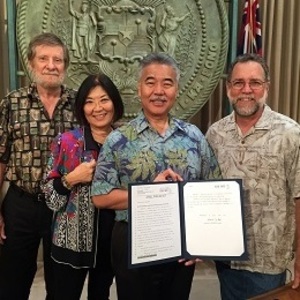Hawaii Gov. Ige signs renewable fuels production tax credit

Photo: Pacific Biodiesel Technologies
July 11, 2016
BY Pacific Biodiesel Technologies
Pacific Biodiesel President Robert King attended in early July the formal signing of the Renewable Fuels Production Tax Credit by Hawaii Gov. David Ige, a long-awaited incentive for biofuels producers in the state. This move supports Hawaii’s commitment to generate 100 percent of its electricity from renewable energy resources by 2045.
Hawaii State Act 202 is a nonrefundable tax credit for the production of renewable fuels, including biodiesel, which will take effect in 2017 for five years. The annual dollar amount of the tax credit is equal to 20 cents per 76,000 Btu of renewable fuel (the equivalent of one gallon of ethanol). The tax credit is capped at $3 million per year.
“This is an excellent incentive because it will encourage investors to fund renewable fuel production facilities in Hawaii, creating jobs and energy security while fighting climate change and reducing environmental damage,” King said. “We’ve been diligently working for the past six years to help pass this legislation.”
Advertisement
Pacific Biodiesel is the nation’s first sustainable biodiesel producer certified by the Sustainable Biodiesel Alliance and Hawaii’s only commercial biofuel producer. The company has built 13 biodiesel plants in the U.S. and Japan and its community-based biodiesel model has become a standard for the sustainable renewable fuel industry in Hawaii and globally. With a nameplate production capacity of 5.5 million gallons annually, the Pacific Biodiesel refinery on Hawaii Island utilizes state-of-the art distillation technology to produce the highest-quality biodiesel in the country.
Advertisement
Related Stories
California’s new specified source feedstock attestation requirement: A critical new compliance step for renewable fuel producers
As of July 2025, California’s SCFS requires renewable fuel producers using specified source feedstocks to secure attestation letters reaching back to the point of origin. This marks a significant shift in compliance expectations.
The public comment period on the U.S. EPA’s proposed rule to set 2026 and 2027 RFS RVOs and revise RFS regulations closed Aug. 8. Biofuel groups have largely expressed support for the proposal but also outlined several ways to improve the rulemaking.
The U.S. renewable fuels industry on Aug. 8 celebrated the 20th anniversary of the Renewable Fuel Standard. Federal lawmakers also marked the occasion with resolutions introduced in the House and Senate earlier this month.
Iowa farmers have a new market opportunity for their 2025 soybean crop. Landus is expanding its Clean Fuel Regulation initiative, made possible by recent policy changes expected to increase Canada's demand for liquid biofuel.
Klobuchar, Moran introduce bipartisan legislation to support biorefineries, renewable chemicals, and biomanufacturing
Sens. Amy Klobuchar, D-Minn., and Jerry Moran, R-Kan., on July 31 announced the introduction of the Ag BIO Act. The legislation aims to update the USDA’s loan guarantee program to better support biorefining projects.
Upcoming Events










